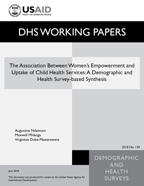- PUBLICATIONS
- JOURNAL ARTICLES
- ACCESS PUBLICATIONS
Publications Summary
- Document Type
- Working Papers
- Publication Topic(s)
- Child Health and Development
- Country(s)
- Zimbabwe
- Language
- English
- Recommended Citation
- Ndaimani, Augustine, Maxwell Mhlanga, and Virgininia Dube-Mawerewere. 2018. The Association between Women’s Empowerment and Uptake of Child Health Services: A Demographic and Health Survey- Based Synthesis. DHS Working Paper No. 139. Rockville, Maryland, USA: ICF.
- Download Citation
- RIS format / Text format / Endnote format
- Publication Date
- June 2018
- Publication ID
- WP139
Download
 The Association Between Women's Empowerment and Uptake of Child Health Services: A Demographic and Health Survey-Based Synthesis (PDF, 771K)
The Association Between Women's Empowerment and Uptake of Child Health Services: A Demographic and Health Survey-Based Synthesis (PDF, 771K)
